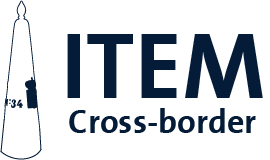Next ITEM – Workshop: Horizontal Integration in cross-border territories
How to get to grips with the particular integration challenges at the internal borders of the EU?
In person: Kapoenstraat 2, Maastricht
or ONLINE
In the academic EU governance world, there has been always a vibrant debate about the relationship between the EU and the member states. Research was focusing, for example, on the relationship of national and EU institutions and the negotiations in Brussels (Intergovernalism, Institutionalism). The debate on Multi-Level Governance fostered the idea that policy making is not limited to the bargaining of national governments, but that authority and sovereignty has moved away from national governments not only to the supranational level, but also to subnational levels such as regions and local authorities. However, European Integration in this perspective was and is widely seen as a vertical process, where EU policies and legislation trigger integration from Brussels to the local level.
Less attention has so far been paid to integration processes at the border of two or more neighboring countries. Typically, even current border studies do not tackle cross-border integration between two neighboring countries as part of EU integration. The first key-note speaker of the workshop, Joachim Beck, Professor and Rektor of the Hochschule Kehl, is an exemption to the rule with his recent publication “Horizontal Integration”. According to Beck, the European border regions perform a specific horizontal integration function. He describes this from the perspective of public administration theory and conceptionalises the policy area of cross-border cooperation in Europe as a horizontal level of integration. He emphasizes, that cross-border governance must also be multi-level governance and enable differentiated, policy-specific approaches for the design of negotiation systems and the practical design of cross-border tasks.
A panel will discuss with him whether and how we can use this analytical approach to describe the current situation of cross-border integration in different parts of the EU and for instance what type of flexible instruments are missing to overcome the well-documented obstacles in different policy sectors.

Accordingly, the question of legitimacy and public participation will be debated. If cross-border institutions – like Euroregions, etc. – will have a stronger say and position with respect to the consultation of law makers or in the implementation of programmes (Interreg, etc.), how can citizens be better involved across the borders. Dr. Peter Ulrich from the University of Potsdam (currently ITEM guest fellow) has written his PhD on „Participatory governance in the Europe of the cross-border regions.” As a second keynote speaker, he will elaborate on his findings especially with respect to the organisations of EGTCs (European Grouping of Territorial Cooperation). A second panel will discuss experiences and options related to public participation with practitioners and academics.
Programme
| 10.30 | Welcome and introduction: Prof. Anouk Bollen, Director ITEM |
| 10.40 | Introduction to the themes by the moderator Martin Unfried |
| 10.50 | First key note presentation |
| Horizontal Integration – An Administrative Science Perspective on Cross-Border Cooperation in Europe Prof. Joachim Beck, Rektor Hochschule Kehl |
|
| 11.35 |
First reflections Martin Unfried: The concept in light of ITEM’s previous work |
| 11.55 | Open debate: Questions related to the concept. What could be the added-value for studying and improving cross-border cooperation and border regions in general with regards to the horizontal integration approach for analyzing cross-border problems and complexity? |
| 12.45 | Lunch |
| 13.45 | Second Key note presentation |
| Cross-border governance and democratic challenges in Europe? Dr. Peter Ulrich, Universität Potsdam Kommunalwissenschaftliches Institut - KWI |
|
| 14.30 | First reflections Loth van der Auwermeulen, PhD UHasselt Martin Unfried |
| 14.45 | Open debate: What are future opportunities with respect to research on public participation and democratic deficits? |
| 15.30 | End of the workshop |

